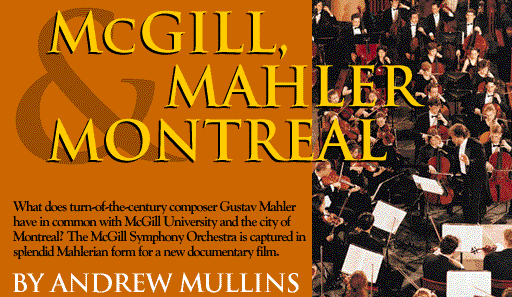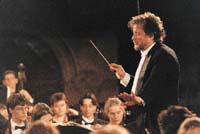
Not so long ago, the music of Gustav Mahler (1860-1911) could be counted on to elicit two distinct reactions: mad devotion among the Mahlerians, and incomprehension among those who wondered how anyone could sit through those gargantuan symphonies. The composer's Eighth Symphony is known as the Symphony of a Thousand, and its first performance included a chorus of 850 singers. Some characterized Mahler as an example of the 19th century gone wrong, a product of the fin de siècle when everything was big, overblown and hurtling towards mammoth disasters like the Titanic or the Great War. But perhaps even more than modern composers like Igor Stravinsky, Béla Bartók, or atonal composer Arnold Schoenberg, Gustav Mahler is a composer for the 20th century, with all of its anxiety, its expansiveness, its schizoid loss of spirituality and longing for redemption.
Devout Mahlerians know this well. In the past few decades, they have been spreading the word, and the public has gradually acquired a deep appreciation for the composer who said of his own neglected work, "In 50 years, they will play my symphonies at orchestral concerts as they now play Beethoven." More and more, Mahler is indeed the composer of choice for large symphonic concerts. But given the immensity of his works, and the difficulties inherent in their performance, it is rather unusual to find a student orchestra taking to the stage with the Resurrection symphony or -- as caught in a new documentary entitled McGill, Mahler and Montreal -- the wonderful Symphony No. 5. The McGill Symphony Orchestra, under the expert and passionate direction of maestro Timothy Vernon, have been taking on the Mahler cycle for the past 10 years, and along the way they are garnering no small amount of praise from audiences and critics alike.
 Vancouver-based film producer Robert Chesterman is one of the converted. "I had been working on a film of a performance of Mozart's Abduction from the Seraglio with Timothy in Vancou-ver, and he began to tell me about what he was doing with the orchestra in Montreal." Vernon, who is also the artistic director of the Pacific Opera in Victoria, B.C., invited Chesterman to come to Montreal and hear the McGill Symphony perform Mahler. Chesterman agreed, partly because he thought a visit to Montreal was past due. He had not seen the city since landing in a snowstorm in 1957 upon immigrating from England. Vancouver-based film producer Robert Chesterman is one of the converted. "I had been working on a film of a performance of Mozart's Abduction from the Seraglio with Timothy in Vancou-ver, and he began to tell me about what he was doing with the orchestra in Montreal." Vernon, who is also the artistic director of the Pacific Opera in Victoria, B.C., invited Chesterman to come to Montreal and hear the McGill Symphony perform Mahler. Chesterman agreed, partly because he thought a visit to Montreal was past due. He had not seen the city since landing in a snowstorm in 1957 upon immigrating from England.
"I was expecting a student orchestra, really," says Chesterman, with all the trepidation that phrase usually implies. "But the standards were so high, and the quality of the performance so high, I decided I had to do something. I really felt people needed to be alerted. Nobody outside of Montreal knows that that quality exists."
It was certainly not a case of a neophyte being charmed by a large orchestra playing unfamiliar music. Chesterman is a veteran of CBC radio, where he worked for 28 years producing classical music programs. He has a lifelong love of Mahler, and a deep knowledge of the man and his work, and brought that knowledge to a radio series devoted to the composer. He has even worked with the legendary Otto Klemperer, one of the first generation of conductors to bring Mahler's music into the orchestral hall and out of obscurity.
Over two years, Chesterman conducted research for the filming of a documentary that would chronicle the rehearsal and performance of Mahler's Symphony No. 5 by the student orchestra, visiting Montreal to scout locations and meeting the people who would work on the film. The former Dean of Music at McGill, John Grew, was very enthusiastic about getting the documentary made and was instrumental in raising the necessary funds. (Grew has a cameo in the film, playing from a turn-of-the-century hymnal on the pipe organ in Redpath Hall.) "We wanted to do it in a professional way," Chesterman says, "so financing was key."
With all the players in place, from film and sound crews to student musicians and conductor Vernon, Chesterman began filming in February 1997, wrapped up in April, and finished editing the documentary last October. The result is a moving look at Montreal and Gustav Mahler's Austria in the early 1900s, McGill in the past and the present day, and a dramatic and inspiring portrait of the students and teachers in the orchestral program of the Faculty of Music as they take on one of the century's most problematic composers.
Mahler himself saw the Fifth Symphony as a problem: "The symphony is accursed," he wrote, "nobody understands it." Timothy Vernon says this is in part because the Fifth "is a departure for Mahler from his first four symphonies, which are of a family. It is very different in its structure, and in its advances and experiments with musical form. The Scherzo alone is gargantuan and hugely difficult to perform."
"Can students do justice to such a great work?" composer and McGill music professor John Rea asks in the film. "The answer is yes." La Presse music critic Claude Gingras emphatically agrees. "There is an enthusiasm not found in some professional orchestras," he says. "The performance is top notch, nothing amateur."
Chesterman suggests two reasons for this quality of performance, aside from the talents of the students themselves. One is Timothy Vernon, who lived in Vienna for ten years and studied there with Hans Swarowsky, a famous teacher of conductors whose past students include Zubin Mehta and Claudio Abbado. Vernon has cultivated a deep knowledge and love of the music, and it shows in the film. The second, Chesterman says, is that "the individual sections of the orchestra are coached by incredibly high-level instructors, wonderful teachers. Different sections come with a degree of preparation that you wouldn't get in an ordinary orchestra."

Timothy Vernon conducting the McGill Symphony Orchestra in a performance of Mahler's Symphony No. 5 at St. Jean Baptiste Church in Montreal. |
One of those instructors, Denise Lupien, is seen in the film rehearsing the string orchestra for the transcendent Adagietto of Mahler's Fifth, a movement written as a profound expression of love for the composer's wife, Alma Schindler, and made famous in North America by Leonard Bernstein when he conducted it at the funeral of President John F. Kennedy. "When they first came to me and said you have to teach them this," Lupien says, "I thought, oh my.... It's very demanding technically. Mahler went to the limit. There is so much atmosphere, colour and texture, it's like time has stopped."
"Mahler has a prophetic aspect to his writing," says Vernon, "in that he understood and delineated a big issue in this century, the undermining of the traditional world view on many levels, particularly the undermining of faith, and the difficulty of faith in the face of an increasingly scientific world. There is a sense of nostalgia in his music -- in George Steiner's wonderful phrase, a 'nostalgia for the absolute' -- and he gave powerful voice to this fundamental fracture in the 20th century."
Lupien points out that Mahler's music may be the very thing for young musicians, since he presents questions of anxiety, life, death and the future in his music, and young people are asking these questions every day. "Even more so these days. They see life more realistically, perhaps in a darker fashion."
For student concertmaster Jonathan Crow, BMus'98, performing Mahler is a chance to stretch out beyond more standard orchestral fare. "Mahler is definitely a test of endurance," says Crow, who started with the Montreal Symphony Orchestra as associate principal second violin in May. "It's very exciting music with big contrasts. The individual parts are harder to perform, putting it all together is harder, and studying with Timothy Vernon, who knows the repertoire as well as anyone in the world, we get a chance to learn how it really should be played."
Producer and director Chesterman is himself well acquainted with music and youth, having made numerous music documentaries, one of which was a study of musical prodigies entitled Which Way to Carnegie Hall?, winner of a Gold Medal at the New York Film Festival in 1988. (The McGill Symphony Orchestra have found their own way to Carnegie Hall more than once, and made a live recording there of Korngold's Symphony in F Sharp Minor in 1990.) Chesterman followed up with a sequel that examined the young musicians after they had moved into adulthood.
As for Montreal, Chesterman wanted to convey something of the city to people who had never seen it, and for lifelong Montrealers it can come as something of a pleasant surprise to see the city through the eyes of newcomers: the architecture of the cityscape comes alive as we are treated to shots of the McGill campus, Sherbrooke Street photographed by William Notman at the turn of the century, Notre Dame Cathedral, art galleries in converted monasteries, and the tiny neighbourhoods that are scattered throughout the city, their lampposts and rooftops festooned with snow. Something of the cultural uniqueness of Montreal is captured in the film, too, as we watch young francophones studying music at an anglophone university talk about the difficulties and joys of performing Mahler, or Dutch emigré and theatrical agent Menno Plukker -- who managed Quebec wunderkind Robert Lepage -- flip back and forth between English and French as he discusses life in Montreal from his home just behind the music faculty on Aylmer Street, where the strains of practising students charm him each day.
"Most of what people outside Montreal see of the city is politics these days," says Chesterman, who was weary of that vision. Instead, he wanted to convey how he sees Montreal in part as the "artistic hub of the nation.
"I wanted to make something that looks up, instead of down. So much depresses people these days, it's nice to see something positive that looks toward the future."
Indeed. As for the future of the McGill Symphony Orches-tra, they have released a compact disc of their performance of Mahler's Symphony No. 5, have recently performed the Adagio from the unfinished 10th Symphony and the symphonic-scaled Das Lied von der Erde (The Song of the Earth) at St. Jean Baptiste Church in Montreal. Vernon says he has "a dream of performing the Eighth Symphony someday" -- the so-called Symphony of a Thousand, with its expanded orchestra and huge chorus -- "and inviting alumni to contribute in the performance."
The orchestra's performance of Symphony No. 5 was also shot in its entirety as a companion film to the documentary by British director Barrie Gavin, one of the top classical performance directors in the world, and will be airing on both English and French CBC television. McGill, Mahler and Montreal and the full-length performance film were broadcast on the Bravo! television network in May. The documentary will air as well on CFCF-12 in Montreal and on the Knowledge Network in British Columbia at a later date, and has just been released on videocassette from the National Film Board. Mahlerians, Montrealers and McGill alike should be well pleased.
|